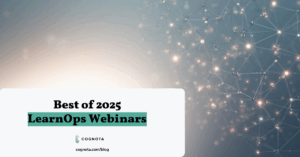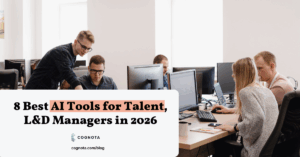Should you give your Subject Matter Experts (SMEs) a deadline?
Of course—she is a team member like everyone else.
Should you create a unique user ID for your SME so that she can access your authoring tool?
Hmmm—that’s a tough one, as this might incur additional expenses.
Questions about working with SMEs arise from time to time, as they are not full-time employees of the L&D department yet their contributions are so vital to the success of learning projects.
Let’s have a look at some questions L&D leaders often need to address when working with this all-important group.
(We are always looking for feedback, so if you have found a way to improve relations with SMEs within your organization, let us know. We’d love to hear from you!)

1. How can I pull them away from their other work?
SMEs do not work full-time for the L&D department. As such, asking them to find time in their busy schedules to help you and your team to build learning experiences can be met with a range of reactions: you might be ignored or worse, told to go away.
The world is changing, however. In many companies, being asked to contribute to learning content has made its way into job descriptions. Many experienced professionals today, especially those in a highly-sought-after niche, expect that at some point, they will need to share their expertise in some way, shape, or form with the company that employs them.
It’s also important to set realistic expectations regarding the time commitment to help L&D. Kyle-Beth Hilfer, an attorney and SME in the areas of intellectual property, new media, and advertising, has found that for each hour of a course, four to five hours of time is required to prepare and create content.
“Clients requesting my expertise consistently underestimate the amount of time that goes into preparing courses,” explains Hilfer. “It’s never a surprise to me, but they may not understand what is involved.”
Have you started digitizing your knowledge capture from SMEs? Check out this free ebook on how Agile can help to power your digital transformation in L&D.
2. How can I emphasize the importance of deadlines?
SMEs may have their own deadlines for their own work. As participating in your learning project may not be considered a priority, they might not feel as committed to submitting their work on time. How can you address this?
When people feel like they are part of a team that values them, they will follow through and contribute without prodding. As we’ve written previously, you want to include the SME as early as possible in your learning project and make her feel valued.
Of course, you can also lean on your project management software to send automated alerts and updates as needed. When the course is built using Agile learning methodologies, Kanban Boards and Daily Standups will make the SME feel like a part of the team and that contributions are valued.

3. Do I need to train them on how to write a course? Do they need special tools?
At first glance, the answer is No. Because their time is so precious, you do not want to waste their time training them on software and processes that they might only need once. That means that you and your team are responsible for transferring their expertise to a format that makes sense for a course.
Further, providing them with credentials to access your LMS or authoring tool might incur additional expenses in the form of a seat license—something that you probably do not wish to do.
However, once you and your time start to evaluate the SME’s content and decide how to present it in a logical, engaging format, you might realize that it’s insurmountable to simply transfer that knowledge to a course that must conform to individual lessons and assessments.
Consider creating a short “mini-course” or detailed walk-through for SMEs on how to convert what they know to courses. Make it generic enough so that an SME can take, say, a typical PowerPoint that she delivers at conferences or to clients, and easily convert it to a format that makes sense for learners.
Indeed, as Albert Einstein once said, “If you can’t explain it simply, you don’t understand it well enough.”
Additionally, you might be surprised. The SME might very well be quite the industry expert outside of your company, and she may have some prior experience in building courses and sharing knowledge. This not only makes your job much easier, but you can lean on their insights to even improve the current project.
However, there are tools and software available (such as Cognota’s instructional design software) that make collaborating and course creating with SMEs a much more efficient process.
4. Do SMEs care about the impact of their work?
You might think that someone who’s main tasks at work do not include authoring learning materials to not care about the impact of their work but the reverse is actually true.
SMEs know that their work provides value to organizations, clients, and perhaps the industry at large, and so their participation in a course for internal use will be no different. They generally will not take it casually.
You can explain the value that she will be bringing to the learning project. Demonstrate the ROI that other SMEs have delivered to the company—in numerical terms, such as the number of learners who will be involved and the expected bottom-line impact to the organization. In fact, you might wish to call on past SMEs to help convince the current SME that the course under consideration is worth her time.

5. Is it OK to contact experts after a learning project is finished?
Absolutely! Keeping in touch is key, for several reasons:
- The course may need to be revised on an ongoing basis.
- Learners may have specific questions for the SME after the course ends.
- You will need the SME to provide feedback on the experience working with the L&D team, for your own internal purposes.
- Create an internal community of SMEs who have successfully built courses, in order to encourage new SMEs to emerge and assist when needed.
Of course, you can decide on the level and frequency of communications, but having an internal “dream team” of SMEs can only bolster your efforts. Building and sharing stories of how L&D’s success rests with SMEs can truly resonate within the organization, and capture the interest of some managers who may be unaware of how you work with such experts. This further promotes your culture of learning.
See how Cognota can help you remotely collaborate with SMEs with course templates, built-in collaboration, and in-product guidance with a personalized demo!




